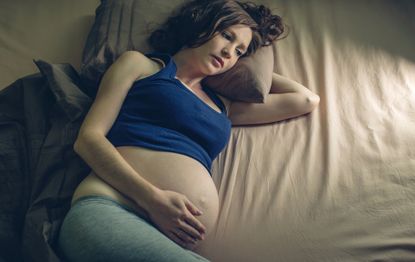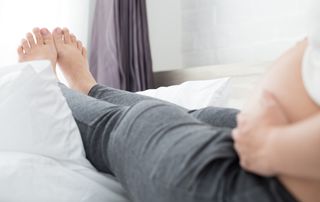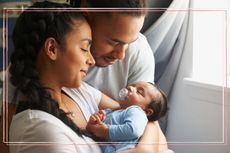Pregnancy cramping, insomnia, headaches and other conditions


Pregnancy is a joyful time but it can also bring on some uncomfortable conditions, such as pregnancy cramping, insomnia and headaches.
Although rarely dangerous to you and your growing baby, pregnancy cramping, insomnia, headaches and other conditions can be annoying and for mums-to-be. Here's how to treat these pregnancy symptoms.
What is pregnancy insomnia?
It’s normal to feel tired during pregnancy, especially in the first trimester when your hormones levels are fluctuating, but what’s less well known is the onset of insomnia – the inability to fall asleep or stay asleep – which can be very frustrating. If this is you you’re not alone; around three-quarters of women suffer from some sort of sleep problem in pregnancy.
What causes pregnancy insomnia? Hormonal changes; depression or anxieties about being pregnant, the birth and becoming a parent; excess napping during the day; frequent toilet trips at night; nausea, heartburn, snoring, back pain and other painful or irritating conditions; and struggling to find a comfortable sleeping position with a bump can all cause temporary insomnia in pregnancy. You may also have unusual dreams or nightmares that, while perfectly normal, can cause wakefulness.
How can pregnancy insomnia be treated?
Here are some ways to tackle pregnancy insomnia:
- Limit your caffeine intake (tea, coffee, cola, chocolate, energy drinks) and completely avoid from late afternoon onwards
- Drink plenty of water in the day but less at night to limit trips to the loo
- Eat a protein-rich dinner that isn’t hot or spicy, which can trigger heartburn
- Drink a small glass of warm milk in the evening
- Try pregnancy yoga or pilates
- Swimming, walking and being active can help you feel less tired in the day and sleepier at night
- A relaxation CD or app can be very helpful, as can meditating
- Don’t use TV screens and phones an hour before bed
- Read or listen to soothing music
- Have a warm – but not hot – bath
- Keep your bedroom cool and well-ventilated, and lighting low
- If you’re feeling depressed or still struggle to sleep after trying these tips, see your GP.
How to sleep safely and better with a bump ‘As your bump gets bigger and you get further on in pregnancy it gets more difficult to be comfortable at night,’ explains Caron, a qualified midwife for the NHS.
GoodtoKnow Newsletter
Parenting advice, hot topics, best buys and family finance tips delivered straight to your inbox.
‘So it’s about finding a position most comfortable for you, usually lying on your side, maybe curled up using pillows to support you and your bump.’
Caron recommends sleeping on your left side, as ‘there’s growing evidence that lying on this side improves the blood flow to the placenta and that means the baby gets more nutrients, but don’t feel you have to stay in that position all night.’
And if you have a supportive partner, Caron suggests massage as ‘it’s always helpful. Probably the best place would be in the lower part of the spine.’
What is cramping in early pregnancy?
Cramping and stomach pains are common in early pregnancy (the first trimester) and even up until the birth. While alarming, these sorts of aches and pains are likely to be benign rather than a sign of something more worrying.
What causes cramping in early pregnancy? There are a few reasons for cramping in early pregnancy: as your womb and ligaments stretch you may experience growing pains in your tummy area as your body accommodates a developing foetus; or you could be constipated or have wind, which are very common in pregnancy.
The cramps will feel like mild period pain or stitch. However, if you find it sore to wee, have a temperature, begin to spot or bleed, see unusual discharge, become dizzy or faint, feel a pain in your shoulder, or if the pain comes on quickly or is severe or persistent, see a doctor as these can be signs of a urine infection, an early miscarriage, or an ectopic pregnancy.
How can cramping in early pregnancy be treated? If the pain is mild or goes away when you move position, walk around, rest, have a warm bath or go to the toilet you have nothing to be concerned about. But if you show one or more of the symptoms above, or something doesn’t feel quite right, contact your GP or midwife.
What causes urine infections in pregnancy?
Urinary tract infections (UTI), or cystitis (a type of UTI that causes bladder inflammation) are as unpleasant as they are common. They are more prevalent in pregnancy because the urinary tract becomes dilated, increasing the chance of bacteria entering the area.
Talking on behalf of Patient.Info, Dr Sarah Jarvis MBE explains that UTIs such as cystits lead to ‘burning, stinging, needing to wee more often, low tummy pain, and sometimes a fever or feeling generally unwell.’ Other symptoms include back pain, bad-smelling urine and feeling sick.
How can urine infections in pregnancy be treated? ‘Antibiotics may be needed, especially if you have blood in your urine, have a high fever, if the symptoms go on for more than two days, and particularly if the pain spreads to your loins,’ says Dr Jarvis. If you’re pregnant it’s especially important that you seek treatment.
To avoid getting a UTI drink lots of water; go for a wee as soon as you feel the need, and after sex; wipe your bottom from front to back; don’t use perfumed products on your genitals; and wear breathable fabrics.

What causes headaches during pregnancy?
Most women get a headache every so often and it’s no different when you’re pregnant. Headaches are more likely to appear in early pregnancy but tend to improve in the last six months. Hormonal changes, stress and dehydration are triggers.
“Some women find they suffer a lot during pregnancy, but most are benign, for example migraine or tension headaches, and will not harm mother or baby,” says Kirsty Revell, a specialist registrar in obstetrics and gynaecology at the Princess Anne Hospital, Southampton.
Sometimes headaches can be sign of something more troubling. ‘While it is important not to cause unnecessary panic, women should be aware that if they suffer from continuous headaches during pregnancy or migraines that are very different their normal type, they should discuss it with their GP or midwife,’ says Revell. After 20 weeks a severe headache could be a sign of pre-eclampsia, while other conditions such as cerebral venus thrombosis or idiopathic intracranial hypertension are rare but life-threatening.
How can headaches during pregnancy be treated? To avoid getting a headache while you’re pregnant sleep, rest, try relaxation techniques or yoga, drink plenty of water and follow a healthy diet. You can take paracetamol for short periods of time but avoid other painkillers. If you’re a migraine sufferer acupuncture may help, but check with your doctor first.
What is restless legs in pregnancy?
Restless Legs Syndrome (RLS) is classed as both a neurological and sleep disorder. It creates an urge to move around to stop odd sensations. Regardless of its name, RLS affects other parts of the body as well as the legs.
According to the charity RLS-UK, the condition affects up to 25 per cent of pregnant women, especially during the third trimester, and often disappears shortly after the birth. Women who already have RLS may find it gets worse during pregnancy.
What causes restless legs in pregnancy? The causes of restless legs in pregnancy are unknown but could be as a result of a folate or iron deficiency, or hormonal or circulatory changes. A low red blood cell count raises a woman’s risk, as does a family history of the condition, or having suffered from it before or during a previous pregnancy.
How can restless legs in pregnancy be treated? RLS-UK recommends that you ‘ask your doctor or midwife about trying supplements such as iron, magnesium, vitamin B12, or folate.’ It’s important to speak to a health professional before taking over the counter medications or supplements.
The charity also advises that some women may ‘find it helpful to stretch their legs, get a massage, use hot or cold packs, take a warm bath (not hot), or practice relaxation techniques. Maybe your partner will massage or rub your legs until you fall asleep.’ Try to be active during the day and avoid smoking and drinking, which may not only harm your baby but make the condition worse.

What causes swollen ankles in pregnancy?
It’s normal to swell during pregnancy. This is because women hold more water when they’re pregnant. The water tends to travel to the lower parts of the body such as the legs, ankles and feet, especially if you’ve been standing for long periods of time or if it’s hot, although swelling can also affect the face and fingers. A growing womb can also cause swelling as it affects the blood flow to the legs.
How can swollen ankles in pregnancy be treated? Keeping hydrated helps, and while it’s good to go for regular walks in comfortable shoes long periods of standing up or crossing your legs can exacerbate the problem so rest with your feet up when possible. Foot exercises are also useful; regularly rotate your feet in both directions and bend and stretch your legs.
Swelling in pregnancy isn’t serious; however, its sudden onset from 20 weeks onwards could indicate pre-eclampsia, which will need medical attention. On its website, the charity Action on Pre-eclampsia explains that ‘swelling of the hands, feet and face caused by fluid retention is often a feature but is also common in normal pregnancy.
Symptoms like upper abdominal pain, vomiting, severe headache, and visual disturbances sometimes arise when the disease has reached an advanced stage,’ so if you’re in any doubt, contact your doctor.
What causes itchy breasts in pregnancy?
One of the many embarrassing problems that pregnant women face, itchy breasts can make pregnant women feel awkward and irritable. It occurs when the breasts expand, stretching the skin and causing itching, which may be confined to the breast area but is likely to be felt elsewhere such as on your bump and legs. Hormones can play a part, too.
How can itchy breasts in pregnancy be treated? Avoid anything perfumed for starters, including biological washing powder (switch to non-biological) and use the purest moisturisers and the best soap-free, scent-free products you can find.
Wheatgerm or oat moisturisers can also alleviate itching, as can an oatmeal bath – this involves grinding up pure rolled oats that are then added to a small muslin pouch or a ladies’ stocking and placed in warm bathwater. Some Mumsnetters swear that Sudocrem and chilled calamine lotion offer relief while, if you suspect thrush, trying using Canesten cream.
It will also make a difference if you avoid getting too hot and sweaty; wear natural, breathable fabrics such as cotton, especially around your breasts (so ditch the lacy bras for now); and keep the bedroom and showers cool.

Debra Waters is an experienced online editor and parenting writer. She also has a strong background on health, wellbeing, beauty, and food. She currently writes for Goodto and Woman&Home, and print publications Woman, Woman’s Own, and Woman’s Weekly. Debra has written for What to Expect, Everyday Health, and Time Out. In addition, she has had articles published in The Telegraph and The Big Issue.
-
 I tested the Lakeland Dual Basket air fryer and it made midweek family cooking a breeze
I tested the Lakeland Dual Basket air fryer and it made midweek family cooking a breezeYou can’t go wrong with the dual basket air fryer by Lakeland complete with easy-view windows to ensure burnt food is a thing of the past…
By Jessica Dady Published
-
 Reframing one simple habit could get your sex life back on track after having a baby, new research shows
Reframing one simple habit could get your sex life back on track after having a baby, new research showsMany parents struggle to get their sex life back on track after having a baby, but new research has shown how one simple habit could make all the difference.
By Ellie Hutchings Published